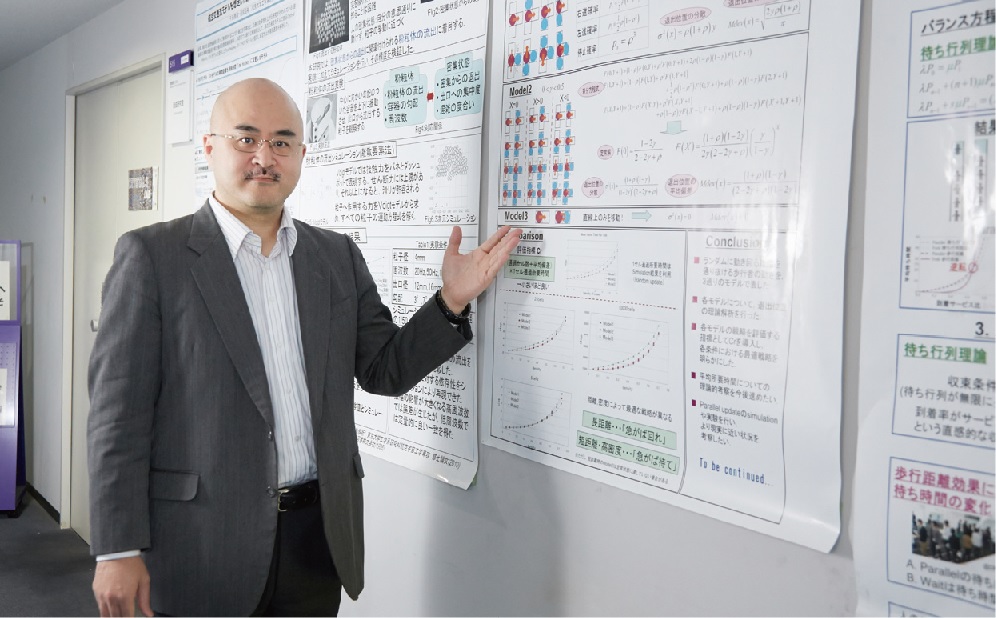- HOME
- Research at RCAST
- Visit to Laboratories
- Nishinari Laboratory
Nishinari Laboratory

‘More haste, less speed.’
I’ve found through my research on traffic jams that this proverb is right.
Traffic jams are caused by driving too close to the cars ahead.
This conclusion means that if you try to get past other cars in attempting to drive to your destination as soon as possible, all of the drivers on the road including yourself will end up becoming the loser.
Let’s take society of ants as an example. They have inhabited the earth for two hundred million years.
There are no traffic jams in a column of ants moving because they always keep their distance from the ant ahead.
Being at ease and leaving a space leads to optimization and brings about an energy that enables us to live in unstable and uncertain environment.
It is very important for us to take a long-term vision of the situation.
There are various kinds of jams in human society.
I would like to continue to grapple with my research on solving the jams we see in society.
What is 'Jamology'?
You may have seen traffic jams on the highway during the 'Golden Week' holidays, at a production line in a factory, or at a station at rush hour. Jams can be seen wherever humans, materials, or cars come and go. Prof. Nishinari tackles research on 'jamology,' aiming to clear up all sorts of jams in society by clarifying the cause of the jams using scientific methods.
He explains, "When something ahead clogs the flow, the things following areunable to go ahead, which is the only law of jams." On the basis of this law, he modeled phenomena of jams and mathematically proved that a traffic jam will hardly occur if each driver keeps a distance of 40 meters from the car ahead. He conducted demonstration examinations on real highways to prove their theory of solving traffic jams. When the members of the research team drove a car in a traffic jam, they tried to keep a distance of 40 meters between their car and the car in front of them. Then, they found that the traffic jam got better. Prof. Nishinari thinks that it is an important role for them to keep announcing the results of their research through media like TV or newspapers. "What I aim is to resolve jams without spending huge amounts of money.
Widening roads or making new devices should be the last resort," said he.
A Childhood filled with Curiosity
Since his childhood, Prof. Nishinari said that he is eager to achieve something original, something which other people have never done. "I didn't want to be influenced by other's ideas or thoughts. For example, I had kept thinking over one question in mathematics for a year because I did not want to check its model answer," he looks back to his youth like this. Although he was interested in many fields of science, what interested him most was astronomy. He specialized in it when he was a student at Tokyo University. But gradually he came to want to find the principles which can be applied to various phenomena. So he chose mathematical physics when he went on to his doctoral course. With the resolution that his life would end if he could not achieve anything, he was absorbed in his study. Forcing himself into study during the days of his doctoral course, he gained confidence in himself and found the field where he should research in the future. It was what he named 'jamology,' a new field of study to solve jams by applying mathematical physics.
Blossoming after Going Through Bitter Days
But at first 'jamology' was not accepted by the scientific community. He could not receive research funds even after three years of research and he could gain little understanding from those around him. He had to spend his own salary to fund his research. He sometimes thought, "Although I've conducted research on such a new field, no one is willing to accept it. What am I doing? ," which made him depressed. But one day his senior gave him some advice. The senior said, "Keep on doing the same research for at least seven years. If you give up before reaching something, you will never achieve anything new." Hearing these words, he could keep studying, Prof. Nishinari said. "Those who do something cutting edge have to go through such bitter days because such things are not accepted at first. But these people are the very ones who will achieve great things later," he said.
'Jamology' has been improving from day to day, integrating not only mathematics but also psychology, economics, and many other fields of research.
Nowadays it is impossible to solve some problems if you study only one field. "Those who have a competitive spirit and optimistic ideas surely can succeed in their research. We welcome such students as members of our lab," said Prof. Nishinari.



